Ebola outbreak in DRC : Healthworkers must be protected

The Democratic Republic of Congo has been struck for the 9th time by the Ebola virus disease.
While in the past, Ebola occurred in isolated villages with low chance of spreading, this time it started in Bikoro a village near the Congo stream with much more trade and transport possibilities. The disease further appeared in Mbandaka, a major centre of economic interest in the country, whose population is estimated at 1.2 million inhabitants. Given the trade flows moving in and out of this city, risks are high of further spreading towards Kinshasa, but also to neighbouring countries.
The WHO has warned for the risk of an epidemic and has called together an emergency committee that will decide whether to declare a public health emergency of international concern, which would trigger more international involvement, mobilising research and resources.
Epidemiologists are working in the field to identify people who have been in contact with suspected cases. It is estimated that more than 300 people might have been in direct or indirect contact with individuals contaminated with the Ebola virus in Mbandaka, where panic has been rising while people are trying to find a way out of the city.
As of May 25, 2018, the epidemiological situation is as follows:
- 55 recorded cases of which 20 confirmed, 25 probable and 10 suspects
- 27 registered deaths among which 1 health staff, a nurse
- Two cases are recorded at Mbandaka and there is a suspected case at the general reference hospital in Kinshasa, which all have been quarantined.
The Congolese Minister of Health has established a Committee chaired by himself to try to contain the epidemic, with the collaboration of technical and financial partners of the Ministry, including international partners on the ground. This coordination supervises the various commissions linked to the response: logistics, communication support, laboratory, water and hygiene, etc.
On the frontline of the fight against the disease is a newly developed vaccine. The first batch of over 4,000 shots was sent by the WHO to Kinshasa and vaccinations of health workers and people suspected of coming into contact with the disease has begun. The vaccine requires storage at a temperature between -60C and -80C; tricky in a country with unreliable electricity.
Furthermore, the response includes the reservation of 55 beds for isolation and treatment of victims and the construction of 2 treatment centres with a capacity of 20 beds each. Fifty tons of material and equipment has been made available.
SOLSICO, the Congolese nurses’ union and affiliate of PSI, has been participating in the technical meetings organized by the Minister of Health for planning the response. It has denounced the non-compensation of Ebola health workers and made sure enough information was given about the quality and risks of the experimental vaccine which health workers would be injected with. To prepare its participation and interventions, SOLSICO established an Ebola trade union committee that analyses the information received by the government but also from SOLSICO’s own provincial representation in Mbandaka.
But SOLSICO is also planning active interventions, in order to help reduce the risk of disease by actively informing its members on protection procedures, in particular on hygiene and water as well as other professional techniques. Trainers will be prepared in order to enlarge the reach of the awareness raising. A field trip to Mbandaka and Bikoro will also give moral support and reduce panic among health workers. SOLSICO is attempting to have this information distributed on radio and television, so the whole population is aware of how to avoid infection by the Ebola Virus Disease.

